In project management, the Project Management Professional (PMP) certification stands as a beacon of excellence. Recognized globally, PMP Certification is a testament to a professional’s dedication, skills, and knowledge in leading successful projects. If you’re considering taking the plunge into the world of PMP, this comprehensive guide will illuminate the path, covering everything from requirements to exam details and valuable preparation tips.
Page Contents
What is PMP?
Before beginning the certification process, it is critical to grasp the nature of the Project Management Professional (PMP) credential and its significance in the industry. The Project Management Institute (PMI) offers a PMP certification called “Project Management Professional.” This credential is recognised all around the world. Professionals with this skill can successfully manage and direct projects, ensuring they meet deadlines while staying within budget and making the most of available resources.
Requirements for PMP Certification
You need to meet certain requirements before starting the path to PMP certification. Candidates must demonstrate that they have the education, training, and work experience to meet the demanding standards of professional project management by meeting these criteria.
Educational Background: A prospective PMP candidate must have a secondary degree (high school diploma, associate’s degree, or global equivalent) and at least 60 months of project management experience. On the other hand, 36 months of project management experience is required of those with a four-year degree (bachelor’s degree or its worldwide equivalent).
Project Management Experience: PMP certification is not for novices. Applicants should have an extensive background in project management. Experience is more important for those with a secondary degree than those with a bachelor’s degree.
Project Management Education: Besides practical experience, candidates must undertake project management education. This requires 35 hours of formal education in project management, which may be attained via various means, such as classroom instruction, hands-on workshops, or even online resources.
The PMP Exam: What to Expect
After meeting the qualifications, the next stage is to prepare for the PMP test. The test exhaustively evaluates the candidate’s abilities in project management-related knowledge, analysis, and decision-making. So, here’s the deal:
Exam Format: The PMP exam consists of 180 multiple-choice questions over four hours. The PMBOK, or Project Management Body of Knowledge, is a foundational resource for anybody aiming to become a Project Management Professional (PMP). It is the basis for the questions.
Question Types: The questions in the PMP exam are scenario-based and require a deep understanding of project management concepts. Some inquiries may lay out a situation before asking for advice on how to fix it or apply a certain project management concept.
Tips for PMP Exam Preparation
A solid grasp of project management principles and diligent study and preparation are required to pass the PMP test. To better prepare, consider the following:
Create a Study Plan: Develop a realistic study plan that allocates sufficient time to cover all the knowledge areas outlined in the PMBOK guide. To avoid being overwhelmed, divide your study periods into
Utilise PMP Resources: Leverage various study materials, including the PMBOK guide, practice exams, and reference books. You may also get helpful advice and encouragement from others who have already earned the PMP credential in online study groups and forums.
Practice, Practice, Practice: Take practice exams regularly to familiarise yourself with the exam format and time constraints. Determine where you need to put more effort by analysing your performance.
Understand the PMBOK Guide: The PMBOK guide is the foundation of the PMP exam. Its ten knowledge domains and five process groups (Initiating, Planning, Executing, Monitoring and Controlling, and Closing) should be carefully studied to guarantee a thorough comprehension of its contents.
Join a PMP Exam Prep Course: Consider enrolling in a PMP exam preparation course. Structured courses covering the test material with professional supervision and practice examinations to see how you’re doing are available at many schools.
Conclusion
Earning your PMP certification is a challenging but worthwhile endeavour. In addition to boosting your credibility in the workplace, this course will teach you the fundamentals of project management and how to use them in a wide range of sectors. You may confidently pursue PMP certification and unlock new opportunities in your project management career by meeting the requirements, learning the test methodology, and using efficient study techniques. Remember that being an amazing Project Management Professional requires more than just passing the test.


